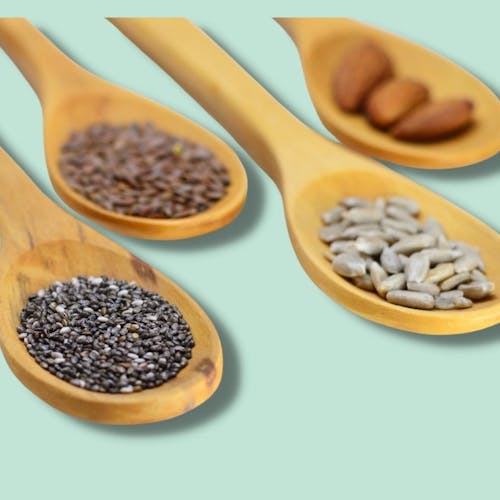This website uses cookies to enhance the user experience. By using Yoppie you are agreeing to our use of cookies.
Can A Vegetarian Or Vegan Diet For PCOS Actually Help?
Written by Yoppie
31 Jan 2022
How does my diet affect my PCOS symptoms?
Does eating less meat help?
So being a full-time vegan… won’t help my PCOS?
What about a diet that’s just anti-inflammatory?
I’m still not sure. Should I go vegan or veggie for my PCOS symptoms?
More and more people are choosing to try initiatives like meat-free Mondays and Veganuary, or becoming full-time vegans or vegetarians, whether for their health, their love of animals, or for the environment. Going vegan or veggie can be a positive choice for a number of reasons, but we wondered; what if it could help your PCOS symptoms? Let’s take a look…
How does my diet affect my PCOS symptoms?
Diet has such a big impact on every part of our lives, even if we don’t suffer from a health condition. For those with PCOS however, symptoms can sometimes worsen depending on what you eat. This is because people with PCOS are often insulin resistant, and when they experience a higher insulin level than normal and their blood sugar rises, their body tries to balance it by producing more insulin. It’s these high levels of insulin that can cause the ovaries to make more androgens… the hormones responsible for the PCOS symptoms you know and loathe!
Does eating less meat help?
Though more research is needed in this area, it is believed that consuming excess red meat - such as steaks, hamburgers and pork - could exacerbate the symptoms of PCOS, so in theory, a vegetarian diet could help. Some studies have found mixed results, stating that those who ate a typical Western diet, and those who ate solely plant-based, were associated with a higher risk of PCOS, while those who ate a mixed diet were associated with a lower risk of PCOS. If this is the case, it could suggest that a semi-vegetarian approach may be the way to go, i.e. eating more plant-based as opposed to entirely plant-based.
So being a full-time vegan… won’t help my PCOS?
There is a lot of anecdotal evidence to support the idea that eating vegan will cure just about any ailment you can think of. This is untrue (case in point; the study mentioned above suggests veganism produced less results when it came to easing PCOS symptoms)... however! We can’t ignore that a plant-based diet has been found to produce some rather undeniable anti-inflammatory benefits which can have positive effects all round, whether you have PCOS or not.
Since PCOS is known as a pro-inflammatory syndrome that’s linked to issues such as high cholesterol, nutrition deficiencies and gut health, a vegan diet that is high in fibre and essential nutrients can lower cholesterol and LDL (low-density lipoprotein) levels, and improve symptoms as a result. And being a diet that naturally eliminates some of the most inflammatory foods, it has the potential to help improve gut bacteria, reduce inflammation, control insulin resistance, balance hormones and more.
It would also appear from this study (which features a number of different diets) that a vegan diet was the most effective in producing weight loss results in those with PCOS, which can subsequently benefit symptoms. Taking into account these anti-inflammatory and weight loss elements, there seems to be the potential to improve PCOS symptoms with a plant-based diet, so with your doctor’s approval, it may be one to try if you want to improve yours.
What about a diet that’s just anti-inflammatory?
If you’re not quite ready or uninterested in switching to a fully vegan diet, you could still see benefits from simply focusing on anti-inflammatory foods. One study published in the North American Journal of Medical Sciences found that those with PCOS who followed an anti-inflammatory diet for three months were successful in losing 7% of their body weight, and showed notable improvements in blood pressure, cholesterol and inflammatory markers. They also noted improvements in patients’ menstrual cycles, with 63% of participants returning to a ‘normal’ cycle, and 12% conceiving while following the diet.
As with anything diet-related, it’s important to note that not everyone will have the same positive results, but it’s good to know your options when it comes to managing PCOS symptoms. And remember, always consult your doctor to ensure they know of any drastic changes you plan to make, in case these affect your treatment or medications.
I’m still not sure. Should I go vegan or veggie for my PCOS symptoms?
Ultimately, if you want to try a plant-based diet and your doctor feels it won’t interfere with any treatment you are on, then this could be a good way to improve symptoms. Remember to ensure you include enough of the nutrients that are important for those with PCOS but sometimes neglected when eating plant-based. We’re talking fibre, plant-based protein, omega-3 fats, and more - it’s not just about cutting foods out, it’s about including the vitamins and minerals you need.
If you’re not ready to join in on the plant-based hype yet, you may still see results by reducing your meat intake and focusing on including more nutritious foods. A sort of flexitarian approach, if you will! This can help you see how your body reacts, and if the results are positive, slowly transition to more of a plant-based diet if you feel it’s right for you.
Have you tried a diet change to help improve PCOS symptoms? We’d love to hear about your results! Our Full Stop FB group is a great place to chat to others who may be trying to improve symptoms, and if you have any Qs reach out to us on Instagram at @itsyoppie. Don't forget that our personalised menstrual care subscription can get organic tampons, PMS supplements and much more delivered easily and regularly through your letterbox, to help keep at least some of that PCOS pain under control each month.
Section jump
Back to top
Subscribe To Our Newsletter
YOPPIE





© 2026 Yoppie is a registered trademark of Phlo Technologies Ltd.
Yoppie's supplements are not a substitute for a varied diet and healthy lifestyle and are not intended to diagnose, treat, or cure any disease. If you are pregnant, breastfeeding, have a medical condition or are under medical supervision, please consult with your doctor before taking any of our products.






